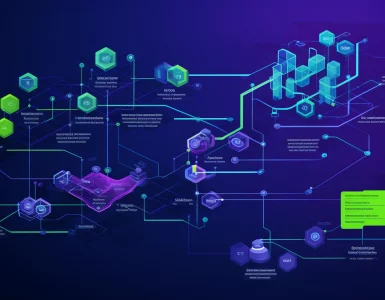As a Java developer, have you ever felt like you’ve hit a plateau in your growth and are looking for new ways to level up your skills?
The ever-evolving technology landscape and increasing demand for high-quality software solutions make it crucial for developers to stay current and improve their skills.
That’s why in this blog, we’ll be sharing 10 tips to help you become a better Java developer in 2023. From mastering core Java concepts to staying up-to-date with the latest tools and technologies, these tips will guide you on your journey to becoming a top-notch Java developer.
What is Java Programming?
Java is a high-level, object-oriented programming language that was developed by Sun Microsystems in the mid-1990s. It is designed to be portable and run on any platform, which is achieved by compiling the code into an intermediate format called Java bytecode.
This bytecode can be executed on any machine that has a Java Virtual Machine (JVM) installed. Java is used to develop a wide range of applications, from desktop software to mobile apps and enterprise-level systems.
It is known for its simplicity, security, and scalability, making it a popular choice for developers across the world.
Why has Java become one of the most popular programming languages for developers?
Java’s combination of portability, ease of use, robustness, and security has made it a popular choice for developers and organizations worldwide.
The following are the top-most reasons contributing to Java’s immense popularity:
- Platform independence: Java code can run on any device that has a Java Virtual Machine (JVM) installed, making it platform-independent.
- Object-Oriented Programming: Java is based on the principles of Object-Oriented Programming (OOP), which allows developers to create reusable and modular code.
- Easy to learn and use: Java has a simple, clean syntax that is easy to learn, especially for developers who have prior experience with OOP.
- Robust and Secure: Java has a strong type-checking mechanism and an automatic memory management system, making it less prone to errors and security vulnerabilities.
- Large Community and Support: Java has a large and active community of developers who constantly contribute to the language’s development and provide support to one another.
- Wide Range of Applications: Java is used for developing a variety of applications, including desktop software, mobile apps, and enterprise-level systems, which has further fueled its popularity.
10 Tips To Become a Better Java Developer in 2023
As a Java developer, it’s important to stay up-to-date with the latest tools and technologies and continually improve your skills.
Master the fundamentals of Java
Before diving into more advanced topics, make sure you have a solid understanding of core Java concepts.
The basics of Java programming include:
- Syntax: The syntax of Java is based on the syntax of C and C++, with some additional features. It’s important to be familiar with Java’s syntax and understand how to write valid Java code.
- Data Types: Java supports various data types such as int, float, double, and char, among others. It’s important to understand the difference between these data types and how to use them effectively in your code.
- Variables: Variables are used to store data in Java. It’s important to understand how to declare variables, assign values to them, and use them in your code.
- Control Structures: Java has several control structures such as if-else statements, loops (for, while, and do-while), and switch statements. It’s important to understand how to use these control structures to control the flow of your code.
- Object-Oriented Programming (OOP): Java is an object-oriented language, which means that you write code using objects and classes. It’s important to understand the concepts of inheritance, polymorphism, and encapsulation, among others.
To master these basics, you can follow these steps:
- Write code: Writing code is the best way to reinforce your understanding of the basics. Start with simple programs and gradually move on to more complex projects.
- Study real-world Java applications: Learn from real-world Java applications by examining their source code and understanding how they use Java features and libraries.
- Seek feedback: Share your code with others and solicit feedback to identify areas for improvement and learn new techniques.
- Invest in learning resources: Consider purchasing a Java course or textbook to enhance your understanding of the language.
- Use debugging tools: Utilize Java’s debugging tools to identify and fix errors in your code, and to gain a deeper understanding of how the language works.
Stay up-to-date with Java versions
Java is continuously evolving, and it’s important to keep pace by staying current with the latest versions and their new features.
Here are some tips for keeping up-to-date with Java:
- Follow Java-related blogs and websites: Stay informed about the latest Java releases and changes by following Java-related blogs and websites, such as Talent500.
- Subscribe to Java newsletters: Sign up for newsletters and email updates on Java-related platforms to receive regular updates on the latest Java releases and changes.
- Attend conferences and meetups: Attending conferences and meetups is a great way to stay up-to-date with the latest developments in the Java world and network with other Java developers.
- Follow Java-related profiles, accounts and pages on social media: Follow Java-related channels on social media platforms such as Twitter, LinkedIn, and Facebook to stay informed about the latest Java news and updates.
- Read Java books and tutorials: Keep up-to-date with Java by reading the latest Java books and tutorials, and by taking online courses.
- Get involved in the Java community: Join online forums, attend meetups, and participate in coding competitions to stay connected with other Java developers and learn from their experiences.
Practice writing code
The more you practice, the better you’ll sharpen your development skills. Set aside time each day to work on coding exercises and personal projects.
Here’s how you can start:
- Start with simple programs: Start with simple programs and gradually move on to more complex projects as you gain confidence and experience.
- Work on personal projects: Work on personal projects that interest you, and that challenge you to use your Java skills in new and creative ways.
- Participate in coding challenges and contests: Participate in coding challenges and contests to put your skills to the test and learn from other programmers.
- Collaborate with others: Work with other programmers on a project, or pair programs with someone to learn from their skills and techniques.
- Use version control: Use version control tools such as Git to keep track of your code and collaborate with others.
- Study other people’s code: Study the code of other Java developers to learn new techniques and best practices.
Read Java documentation
Java has extensive documentation that can help you better understand its features and capabilities. Make a habit of reading through it regularly.
But what exactly is Java Documentation?
- Java documentation is a comprehensive set of materials that provide information about the Java programming language and its libraries, classes, methods, and functions.
- The Java documentation includes reference information, tutorials, examples, and guides for using Java to develop applications.
- Java documentation is an essential resource for Java developers and is used to learn about the various features and capabilities of the Java programming language, as well as to find solutions to specific programming problems.
- The Java documentation is available online through the Java SE Documentation website and can also be downloaded for offline use.
Use code versioning tools
Code versioning tools, also known as version control systems, are software tools that help manage and track changes to source code. They allow developers to keep track of different versions of their code, revert to previous versions if necessary, and collaborate with other developers on a project.
Some popular code versioning tools include:
- Git: A widely used, distributed version control system that supports collaboration and provides a powerful set of features for tracking changes to code.
- Subversion (SVN): A centralized version control system that provides basic versioning features, including the ability to revert to previous versions of code.
- Mercurial: A distributed version control system that is similar to Git, and provides a simple, fast, and scalable way to manage code.
- Microsoft Team Foundation Server (TFS): A centralized version control system that provides a range of versioning and collaboration features for Microsoft-based development teams.
Learn a Java framework
Familiarize yourself with popular Java frameworks such as Spring, Hibernate, or JavaServer Faces to build more complex applications.
But what exactly are Java frameworks?
Java frameworks are pre-written, reusable code libraries that provide a foundation for building applications. They provide a set of tools and patterns for solving common development problems and help developers write code more quickly and efficiently. Some popular Java frameworks include:
- Spring: A popular, full-featured framework for building Java-based applications, offering a range of features for web development, data access, security, and more.
- Hibernate: A framework for mapping Java objects to relational databases, providing a convenient and efficient way to manage database transactions.
- Struts: A framework for building web applications, providing a set of tools for handling user requests, processing user input, and rendering responses.
- JavaServer Faces (JSF): A framework for building component-based user interfaces for Java web applications, providing a convenient and efficient way to create rich, interactive user interfaces.
- Apache Wicket: A component-based framework for building web applications, offering a simple and flexible way to create dynamic, interactive web pages.
By using a framework, developers can focus on writing unique, application-specific code, rather than reinventing the wheel each time they start a new project.
Focus on clean coding
Write code that is easy to read, maintain, and debug, as this will make your life easier in the long run.
Here are some tips and tools for writing clean code in Java:
Use meaningful and descriptive names: Choose meaningful and descriptive names for variables, methods, and classes, to make your code more readable and understandable.
- Follow naming conventions: Follow standard naming conventions, such as CamelCase or snake_case, to make your code consistent and easier to read.
- Write short and simple methods: Write short, simple methods that perform a single, well-defined task. Avoid writing long, complex methods that are difficult to understand and maintain.
- Write comments: Write clear, concise comments to explain the purpose and behaviour of your code, and to make it easier for others to understand.
- Use design patterns: Use design patterns, such as Model-View-Controller (MVC) or Factory, to structure your code in a consistent and organized way.
- Use a linter: Use a linter, such as Checkstyle or PMD, to check your code for common programming errors, such as unused variables or uninitialized variables.
- Use a code formatter: Use a code formatter, such as Google Java Format, to automatically format your code, and to enforce consistent coding styles.
Invest in automation
Automation tools can help you reduce repetitive tasks and increase your productivity. As a Java developer, there are several automation tools that can help you write, test, and deploy code more efficiently and effectively. Here are some popular automation tools for Java programming:
- Build Tools: Apache Maven and Gradle are popular build tools for Java that can help automate the process of building, testing, and deploying Java applications.
- Continuous Integration Tools: Jenkins, Travis CI, and CircleCI are popular continuous integration (CI) tools that can help automate the build and deployment process, and catch and fix bugs early in the development cycle.
- Unit Testing Frameworks: JUnit and TestNG are popular unit testing frameworks for Java that can help automate the process of testing individual components of your code.
- Code Coverage Tools: JaCoCo and Cobertura are popular code coverage tools for Java that can help measure how much of your code is being tested, and identify untested areas that need more attention.
- Debugging Tools: Java Debugger (jdb) and Eclipse Debugger are popular debugging tools for Java that can help identify and fix bugs in your code.
- Profiling Tools: VisualVM and JProfiler are popular profiling tools for Java that help identify performance bottlenecks in your code, and improve the overall performance of your applications.
Focus on futuristic technical aspects
Learn JVM language Kotlin
Kotlin is a cross-platform, statically-typed, JVM (Java Virtual Machine) language that is concise, expressive, and interoperable with Java. It was developed by JetBrains and is now officially supported by Google for Android app development.
Kotlin has several features that make it appealing to developers, such as null safety, extension functions, type inference, and more. It is considered a more modern alternative to Java, with a smaller and more concise syntax.
Learn and Acquire Java DevOps Tools Kubernetes and Docker
Docker and Kubernetes are popular DevOps tools that are often used in Java development environments.
Docker is a containerization platform that allows developers to package their applications and dependencies into containers. This makes it easy to deploy and run applications on any environment, without worrying about compatibility issues. Docker containers are lightweight, fast, and isolated, making them a great solution for microservices and cloud-based applications.
Kubernetes is an open-source platform for automating the deployment, scaling, and management of containerized applications. It allows you to manage a large number of containers as a single unit, making it easier to deploy and manage applications at scale. Kubernetes provides features such as automatic rollouts, rollbacks, and self-healing, making it a powerful tool for deploying and managing applications in production.
Together, Docker and Kubernetes provide a complete solution for the containerization and deployment of Java applications.
Understand Design Patterns
Design patterns in Java are pre-defined solutions to common software design problems. They provide a reusable and flexible approach to solving common programming challenges, such as object creation, managing object relationships, and managing system complexity.
Examples of some common design patterns in Java include:
- Factory pattern – a creational pattern that provides an interface for creating objects in a superclass, but allows subclasses to alter the type of objects that will be created.
- Singleton pattern – a creational pattern that ensures a class has only one instance and provides a global point of access to it.
- Observer pattern – a behavioural pattern that allows objects to be notified when an event occurs in another object.
- Decorator pattern – a structural pattern that allows behaviour to be added to an individual object, either statically or dynamically, without affecting the behaviour of other objects from the same class.
Wrapping Up
Becoming a better Java developer requires a combination of technical skills, problem-solving abilities, and a passion for learning and growing.
By following the tips discussed in this blog, you can improve your Java programming skills, stay up-to-date with the latest developments in the field, and write high-quality, maintainable code.
Remember, becoming a better Java developer is an ongoing process, and requires a commitment to continuous learning and improvement.






Add comment